英语课堂笔记(句子结构)
英语书课堂笔记

英语书课堂笔记一、单词部分。
1. 重点单词。
- 单词1:[英文单词]- 词性:[名词/动词/形容词等]- 词义:[中文释义]- 例句:[例句内容]- 单词2:……2. 词汇拓展。
- 词根词缀相关。
- 例如:[单词]的词根是[词根],加上后缀[后缀]变成了[拓展单词],词义也从[原词义]变为[新词义]。
- 同根词:[列出同根词及其词性和词义]3. 易混淆单词。
- 单词A和单词B。
- 区别:单词A侧重于[具体区别内容1],而单词B侧重于[具体区别内容2]。
- 例句对比:[分别写出两个单词的例句以体现区别]二、语法部分。
1. 语法点1。
- 名称:[语法名称,如一般现在时]- 结构:- 肯定句:[主语 + 动词原形/三单形式(根据主语而定)+ 其他]- 否定句:[主语 + don't/doesn't+动词原形+其他]- 一般疑问句:[Do/Does+主语+动词原形+其他?]- 用法:- 用于描述[具体用法场景,如经常发生的动作、客观事实等]- 例句:[不同句式的例句]2. 语法点2:……三、课文部分。
1. 段落大意。
- 第一段:[概括第一段的主要内容]- 第二段:……2. 重点句子。
- 句子1:[英文句子]- 分析:句子结构为[主、谓、宾等结构分析],其中包含的语法点有[列出语法点],重点单词是[指出重点单词及其用法]- 句子2:……3. 文化知识。
- 在这篇课文中涉及到的[文化知识点,如西方节日、习俗等],[简单介绍相关文化知识]。
五年级上册英语人教版课堂笔记
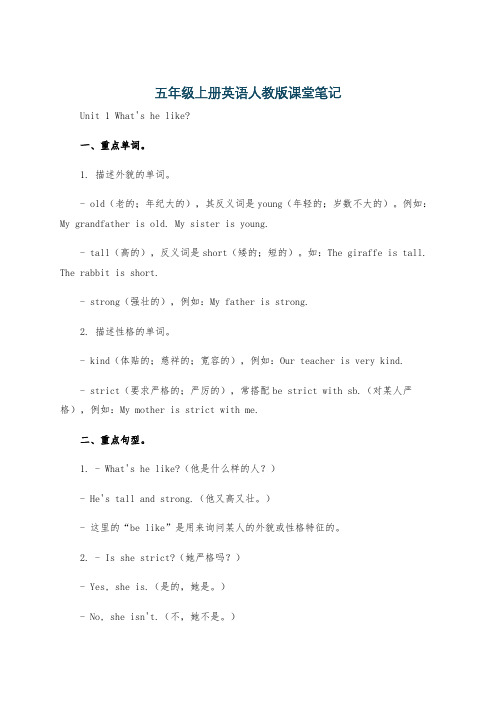
五年级上册英语人教版课堂笔记Unit 1 What's he like?一、重点单词。
1. 描述外貌的单词。
- old(老的;年纪大的),其反义词是young(年轻的;岁数不大的)。
例如:My grandfather is old. My sister is young.- tall(高的),反义词是short(矮的;短的)。
如:The giraffe is tall. The rabbit is short.- strong(强壮的),例如:My father is strong.2. 描述性格的单词。
- kind(体贴的;慈祥的;宽容的),例如:Our teacher is very kind.- strict(要求严格的;严厉的),常搭配be strict with sb.(对某人严格),例如:My mother is strict with me.二、重点句型。
1. - What's he like?(他是什么样的人?)- He's tall and strong.(他又高又壮。
)- 这里的“be like”是用来询问某人的外貌或性格特征的。
2. - Is she strict?(她严格吗?)- Yes, she is.(是的,她是。
)- No, she isn't.(不,她不是。
)1. 形容词的用法。
- 形容词可以用来描述名词的特征。
在句子中,形容词一般放在be动词之后,用来描述主语的特征。
例如:The boy is clever.(这个男孩很聪明。
)Unit 2 My week.一、重点单词。
1. 星期的单词。
- Monday(星期一),Tuesday(星期二),Wednesday(星期三),Thursday (星期四),Friday(星期五),Saturday(星期六),Sunday(星期日)。
- 注意星期单词的首字母要大写。
2. 课程的单词。
- Chinese(语文),English(英语),maths(数学),music(音乐),art (美术),PE(体育)等。
八年级上册英语第三单元课堂笔记
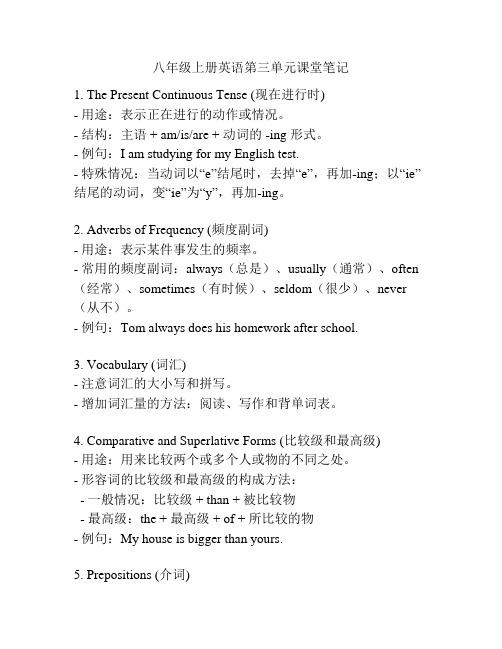
八年级上册英语第三单元课堂笔记1. The Present Continuous Tense (现在进行时)- 用途:表示正在进行的动作或情况。
- 结构:主语 + am/is/are + 动词的 -ing 形式。
- 例句:I am studying for my English test.- 特殊情况:当动词以“e”结尾时,去掉“e”,再加-ing;以“ie”结尾的动词,变“ie”为“y”,再加-ing。
2. Adverbs of Frequency (频度副词)- 用途:表示某件事发生的频率。
- 常用的频度副词:always(总是)、usually(通常)、often (经常)、sometimes(有时候)、seldom(很少)、never (从不)。
- 例句:Tom always does his homework after school.3. Vocabulary (词汇)- 注意词汇的大小写和拼写。
- 增加词汇量的方法:阅读、写作和背单词表。
4. Comparative and Superlative Forms (比较级和最高级)- 用途:用来比较两个或多个人或物的不同之处。
- 形容词的比较级和最高级的构成方法:- 一般情况:比较级 + than + 被比较物- 最高级:the + 最高级 + of + 所比较的物- 例句:My house is bigger than yours.5. Prepositions (介词)- 用途:在句子中连接名词或代词与其他词汇。
- 常用的介词有:in(在)、on(在……上)、under(在……下面)、between(在……之间)、next to(紧邻着)、behind (在……后面)等。
- 例句:The cat is sleeping under the table.6. Sentence Structure (句子结构)- 句子结构包括主语、谓语、宾语、定语、状语等要素。
四年级上册英语27页课堂笔记
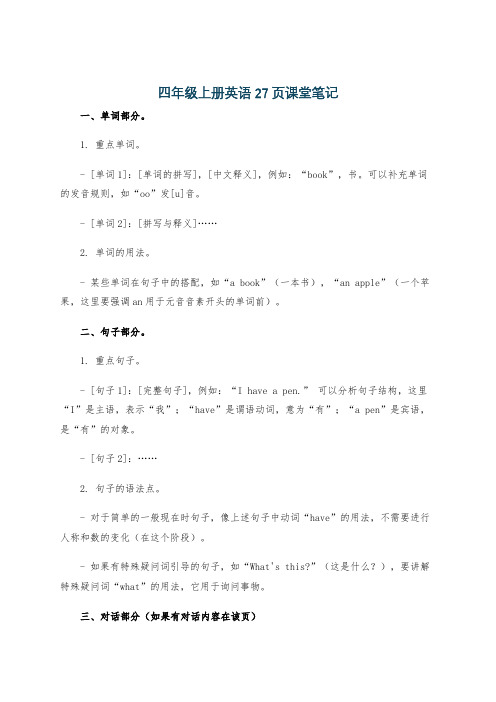
四年级上册英语27页课堂笔记
一、单词部分。
1. 重点单词。
- [单词1]:[单词的拼写],[中文释义],例如:“book”,书。
可以补充单词的发音规则,如“oo”发[u]音。
- [单词2]:[拼写与释义]……
2. 单词的用法。
- 某些单词在句子中的搭配,如“a book”(一本书),“an apple”(一个苹果,这里要强调an用于元音音素开头的单词前)。
二、句子部分。
1. 重点句子。
- [句子1]:[完整句子],例如:“I have a pen.”可以分析句子结构,这里“I”是主语,表示“我”;“have”是谓语动词,意为“有”;“a pen”是宾语,是“有”的对象。
- [句子2]:……
2. 句子的语法点。
- 对于简单的一般现在时句子,像上述句子中动词“have”的用法,不需要进行人称和数的变化(在这个阶段)。
- 如果有特殊疑问词引导的句子,如“What's this?”(这是什么?),要讲解特殊疑问词“what”的用法,它用于询问事物。
三、对话部分(如果有对话内容在该页)
1. 对话人物及场景。
- 例如,对话发生在两个同学之间,在教室里讨论学习用品。
2. 对话中的重点表达。
- 如在对话中用到的“Can I see it?”(我能看看它吗?),要讲解“can”的用法,表示“能够,可以”,后面接动词原形。
2024年英语七年级上册课堂笔记
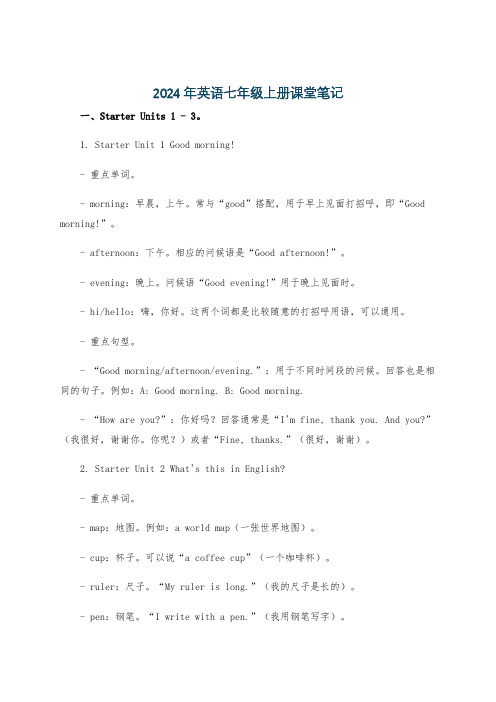
2024年英语七年级上册课堂笔记一、Starter Units 1 - 3。
1. Starter Unit 1 Good morning!- 重点单词。
- morning:早晨,上午。
常与“good”搭配,用于早上见面打招呼,即“Good morning!”。
- afternoon:下午。
相应的问候语是“Good afternoon!”。
- evening:晚上。
问候语“Good evening!”用于晚上见面时。
- hi/hello:嗨,你好。
这两个词都是比较随意的打招呼用语,可以通用。
- 重点句型。
- “Good morning/afternoon/evening.”:用于不同时间段的问候。
回答也是相同的句子。
例如:A: Good morning. B: Good morning.- “How are you?”:你好吗?回答通常是“I'm fine, thank you. And you?”(我很好,谢谢你。
你呢?)或者“Fine, thanks.”(很好,谢谢)。
2. Starter Unit 2 What's this in English?- 重点单词。
- map:地图。
例如:a world map(一张世界地图)。
- cup:杯子。
可以说“a coffee cup”(一个咖啡杯)。
- ruler:尺子。
“My ruler is long.”(我的尺子是长的)。
- pen:钢笔。
“I write with a pen.”(我用钢笔写字)。
- orange:作名词时,意为“橙子,橘子”;作形容词时,意为“橙色的”。
例如:an orange(一个橙子),an orange coat(一件橙色的外套)。
- 重点句型。
- “What's this in English?”:这个用英语怎么说?回答:“It'sa/an...”。
例如:A: What's this in English? B: It's a pen.- “Spell it, please.”:请拼写它。
四年级英语课堂笔记
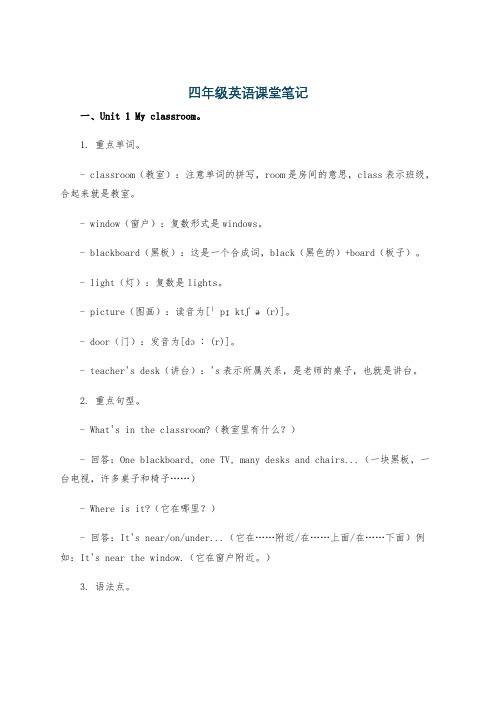
四年级英语课堂笔记一、Unit 1 My classroom。
1. 重点单词。
- classroom(教室):注意单词的拼写,room是房间的意思,class表示班级,合起来就是教室。
- window(窗户):复数形式是windows。
- blackboard(黑板):这是一个合成词,black(黑色的)+board(板子)。
- light(灯):复数是lights。
- picture(图画):读音为[ˈpɪktʃə(r)]。
- door(门):发音为[dɔː(r)]。
- teacher's desk(讲台):'s表示所属关系,是老师的桌子,也就是讲台。
2. 重点句型。
- What's in the classroom?(教室里有什么?)- 回答:One blackboard, one TV, many desks and chairs...(一块黑板,一台电视,许多桌子和椅子……)- Where is it?(它在哪里?)- 回答:It's near/on/under...(它在……附近/在……上面/在……下面)例如:It's near the window.(它在窗户附近。
)3. 语法点。
- 可数名词的单复数:在描述教室里的物品时,要注意单复数形式。
如:a desk (一张桌子),many desks(许多桌子)。
二、Unit 2 My schoolbag。
1. 重点单词。
- schoolbag(书包):由school(学校)和bag(包)组成。
- maths book(数学书):maths是mathematics的缩写形式。
- English book(英语书):注意“English”的开头字母大写。
- Chinese book(语文书):“Chinese”既可以表示中国人,也可以表示语文这个学科。
- storybook(故事书):复数是storybooks。
2024年英语七年级上册课堂笔记
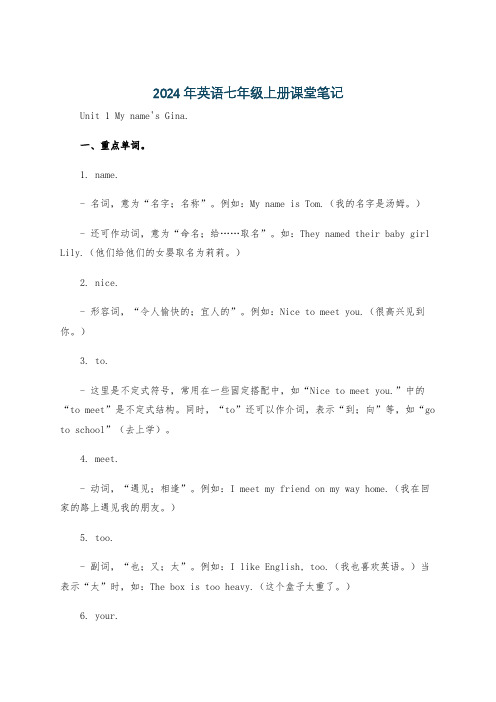
2024年英语七年级上册课堂笔记Unit 1 My name's Gina.一、重点单词。
1. name.- 名词,意为“名字;名称”。
例如:My name is Tom.(我的名字是汤姆。
)- 还可作动词,意为“命名;给……取名”。
如:They named their baby girl Lily.(他们给他们的女婴取名为莉莉。
)2. nice.- 形容词,“令人愉快的;宜人的”。
例如:Nice to meet you.(很高兴见到你。
)3. to.- 这里是不定式符号,常用在一些固定搭配中,如“Nice to meet you.”中的“to meet”是不定式结构。
同时,“to”还可以作介词,表示“到;向”等,如“go to school”(去上学)。
4. meet.- 动词,“遇见;相逢”。
例如:I meet my friend on my way home.(我在回家的路上遇见我的朋友。
)5. too.- 副词,“也;又;太”。
例如:I like English, too.(我也喜欢英语。
)当表示“太”时,如:The box is too heavy.(这个盒子太重了。
)6. your.- 形容词性物主代词,“你的;你们的”。
例如:Your book is on the desk.(你的书在桌子上。
)7. his.- 形容词性物主代词,“他的”。
例如:His name is Jack.(他的名字是杰克。
)8. her.- 形容词性物主代词,“她的”。
例如:Her pen is red.(她的钢笔是红色的。
)二、重点短语。
1. name's = name is.- 例如:My name's Gina. = My name is Gina.(我的名字是吉娜。
)2. nice to meet you.- 用于初次见面时的问候语,回答是“Nice to meet you, too.”(很高兴见到你。
八年级上册英语课堂笔记

八年级上册课堂笔记(1-6单元)Unit 1 Where did you go on vacation1,一般过去时基本结构:主语+动词过去式+其他;否定形式:①was / were + not; ②在行为动词前加didn't,同时还原动词;一般疑问句:①Was/Were+主语+其他②Did+主语+动词原形+其他2,动词过去式规则变化:直接加ed;以不发音e结尾的单词,直接加d;以辅音字母+y结尾的,变y为i加ed;以元音字母+y结尾的,直接加ed;以重读闭音节结尾的,双写最后的辅音字母+ed不规则变化的动词过去式(见书本最后一页)3,go on vacation去度假 be on vacation在度假4,anyone任何人,只用于指人,一般用在否定句、疑问句中,后面不接of 短语。
做主语时位于动词用单数。
Eg:Is there anyone at homeany one任何一个,指人或物,后面接of 短语。
Eg:You can take any one of these books. 5,adj修饰不定代词后置 anything special something importantenough作adv,修饰adj/ adv 后置 old enough fast enoughelse作adj,修饰疑问代词和不定代词后置 what else who else something else 6,quite a few/ little 相当多7,How/ what about+V-ing/ n/ 代词…怎么样(表建议、询问)8,most students= most of the students“one of +the most +adj +n复数”表示“最…之一”Eg:He is one of the most famous writers in China.A most +adj +n 非常 Eg:Hangzhou is a most beautiful city.9,buy/ get sb sth= buy/ get sth for sb10,what do you think of/ about…= how do you like…你认为…怎么样11,have fun,enjoy oneself,have a good/ great/ wonderful time+V-ing,12,主语+ seem+(to be)+表语(n/adj) eg:Tom seems to be a smart boy/ happy.It seems that从句 eg:It seems that he understand.主语+ seem to do sth eg:He seems to understand.13,adj 以-ing结尾“令人…的”exciting,interesting,relaxing,boring 以-ed结尾“人感到…的”excited,interested,relaxed,bored14,询问价格:How much is… What’s the price of…表示价格高低:…be expensive/ cheapThe price of … is high/ low15,get to, arrive in/at, reach,到达(如果后面接地点的副词home,here或there ,就不用介词in ,at, to)16,decide(not)to dodecide that从句decide+疑问词+不定式17,try(not)to do sth尽力try doing sth 尝试try/ do one’s best to do sthtry it on试穿(动副结构) try out试验 have a try试一试18,feel like感觉像 feel like doing sth/ want to do sth/ would like to do sth19,a lot of= lots of =plenty of20,in the past在过去21,enjoy/ like doing22,感叹句:How+adj+主谓!How+adj+a/an +n单+主谓!What+ a/an +adj+ n单+主谓!What+ adj+ n复/ 不可数+主谓!23,more than=over超过 less than 少于 more or less或多或少24,wait for等待25,too many“太多”修饰可数名词复数too much“太多”修饰不可数名词much too“实在太”修饰形容词或副词26,because+从句 because of +n/ V-ing /代词27,enough作adj修饰n, enough time enough moneyhave enough…to do sth eg:I have enough time to finish the work. enough作adv修饰adj/ adv old enough fast enough…enough for sb to do sth eg:The job is easy enough for me to do. not…enough to do The book isn’t easy enough for me to read.too…to… The book is too difficult for me to read.so…that… The book is so difficult that I can’t read.28,the next day第二天29,remember/ forget+to do要做+doing做过30,Stop sb from doing sth阻止Stop to do 停下来去做其他事Stop doing 停止正在做的事31,another two hours=two more hours32,at the top of在…顶端,名列…之前强调点on the top of在…上面强调面33,find out查明,弄清 find找到(结果) look for寻找(过程)34,go on with/ doing sth继续原来的事go on to do sth继续做别的事35,so +adj +that +结果状语从句“如此……以致……”eg:I was so busy that I didn’t go to sleep for 3 days.so that 引导目的状语从句,以便,为了(in order to)eg:they got up early so that they could catch the early bus.so +adj +(a/ an+n单数)that It is so important a meeting that I can’t miss it.such+ a/ an+ adj + n单数+that It is such an important meeting that I can’t miss it.such+ adj+n复数/不可数+thatUnit 2 How often do you exercise1,How 如何(方式)how long 多长(时间)答语常用“(For/ about +)时间段”how far多远(距离)答语常用“(It’s +)数词 +miles/ meters/ kilometers”how often多久一次(频率)答语常用“Always/ often/ every day/…”或“次数+时间”等表频率的状语How soon多快,多久以后,常用在将来时中。
五年级上册第21课课堂笔记
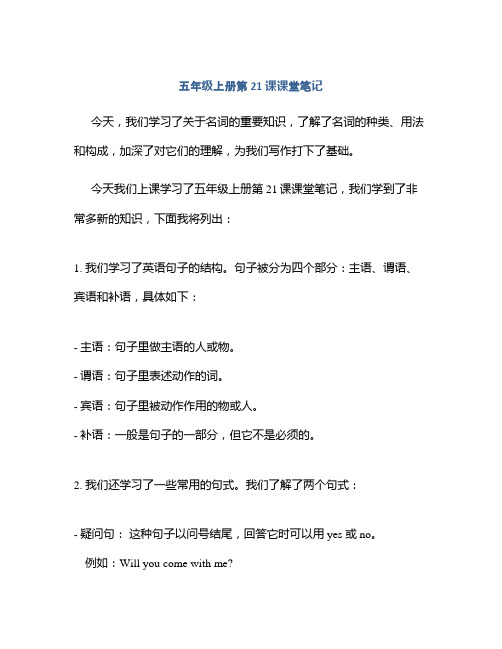
五年级上册第21课课堂笔记
今天,我们学习了关于名词的重要知识,了解了名词的种类、用法和构成,加深了对它们的理解,为我们写作打下了基础。
今天我们上课学习了五年级上册第21课课堂笔记,我们学到了非常多新的知识,下面我将列出:
1. 我们学习了英语句子的结构。
句子被分为四个部分:主语、谓语、宾语和补语,具体如下:
- 主语:句子里做主语的人或物。
- 谓语:句子里表述动作的词。
- 宾语:句子里被动作作用的物或人。
- 补语:一般是句子的一部分,但它不是必须的。
2. 我们还学习了一些常用的句式。
我们了解了两个句式:
- 疑问句:这种句子以问号结尾,回答它时可以用yes 或 no。
例如:Will you come with me?
- 祈使句:这种句子一般用于发出命令或者建议。
例如:Open your book and turn to page 85.
3. 我们还学习了“be going to”的用法。
该句型表示将要发生的事情,如计划、设想、准备或有可能发生的事情,它的标志是going to。
例如:I'm going to visit my grandparents this weekend.(这个周末我打算去拜访我的祖父母)
4. 我们还学习了“will”的用法。
该句型用来表示在将来某个特定的时间一定会发生的事情,它的标志是will 或shall。
例如:I'll call you tomorrow.(我明天会给你打)
今天我们在课堂上学习了很多新知语,让我们不断拓展英语的知识面,变得越来越“英语达人”~。
五年级上册英语课堂笔记
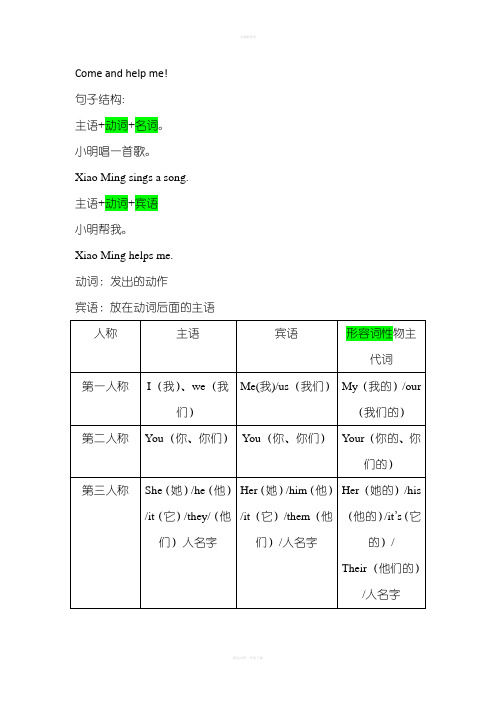
Come and help me!句子结构:主语+动词+名词。
小明唱一首歌。
Xiao Ming sings a song.主语+动词+宾语小明帮我。
Xiao Ming helps me.动词:发出的动作宾语:放在动词后面的主语形容词性:形容词:red 红色的Beautiful 漂亮的Wonderful 很棒的Nice 好看的Kind 热情的Helpful 乐于助人的1、小明把他的书包给她。
(give sb sth/give sth to sb)Xiao Ming gives her his schoolbag.2、小明喜欢小芳的文具盒。
(pencil case)Xiao ming likes xiao fang’s pencil case.3、小芳咬他的脸。
Xiao fang bites his face.4、王子看她的鞋子。
Prince looks at her shoes.5、仙女喜欢他。
Fairy like him.6、妈妈喜欢我。
Mun like me.7.他们喜欢他。
Cinderella, Come and help me!主语+谓语+名词/宾语。
Where are my gloves?一般疑问句和疑问句的区别:一般疑问句:就是在陈述句后面+”吗?”他去逛街了。
他去逛街了吗?他是小明。
He is xiaoming.Is he xiaoming?1、把句中be动词(am is are )提前到主语的前面,然后+句子尾部+“?”2、如果句子中没有be动词,在句子的开头加助动词(do/does/did..)。
这是小明的书包。
This is xiao ming’s schoolbag.Is this xiaomig’s shool bag?(这是小明的书包吗?)那是他的文具盒.That is his pencil case.Is that his pencil case?那时他的文具盒吗?一般疑问句!. ..。
五年级上册英语书第一单元课堂笔记

五年级上册英语书第一单元课堂笔记五年级上册英语(人教版)第一单元课堂笔记。
一、重点单词。
1. old.- 形容词,意为“老的;年纪大的”。
例如:My grandfather is old.(我的爷爷年纪大了。
)- 还可表示“旧的”。
如:This is an old book.(这是一本旧书。
)2. young.- 形容词,“年轻的;岁数不大的”。
例如:She is a young girl.(她是一个年轻的女孩。
)3. funny.- 形容词,“滑稽的;可笑的”。
例如:The clown is very funny.(这个小丑非常滑稽。
)4. kind.- 形容词,“体贴的;慈祥的;宽容的”。
例如:Our teacher is very kind.(我们的老师非常慈祥。
)- 也可作名词,“种类”,如:a kind of(一种)。
5. strict.- 形容词,“要求严格的;严厉的”。
例如:My father is strict with me.(我的爸爸对我要求严格。
)6. polite.- 形容词,“有礼貌的;客气的”。
例如:He is a polite boy.(他是一个有礼貌的男孩。
)7. hard - working.- 形容词,“工作努力的;辛勤的”。
例如:My mother is hard - working.(我的妈妈工作很努力。
)8. helpful.- 形容词,“有用的;愿意帮忙的”。
例如:He is helpful at home.(他在家很愿意帮忙。
)9. clever.- 形容词,“聪明的;聪颖的”。
例如:The little monkey is very clever.(小猴子非常聪明。
)10. shy.- 形容词,“羞怯的;腼腆的;怕生的”。
例如:The girl is shy.(这个女孩很腼腆。
)二、重点句型。
1. 询问他人的外貌或性格特征。
- What's he/she like? 他/她是什么样的人?- 回答可以是:He/She is + 形容词(描述外貌或性格特征)。
四年级下册英语书17页课堂笔记

四年级下册英语书17页课堂笔记第一层次:主语,谓语(系动词),宾语,表语。
第二层次:定语,状语,补语。
第三层次:同位语,插入语。
九种状语:时间,地点,原因。
条件,目的,方式。
结果,让步,比较。
Our lives are brief, that's why it's important to search for meaning.人生短暂,所以才要寻找它的意义。
五大简单句:主语+谓语。
She came.她来了。
The baby smiles.婴儿微笑。
主语+系动词+表语。
主语+谓语+宾语+宾语补足语。
1、The teacher asked the students to answer the questions.老师要求学生回答问题。
2、My friend invited me to attend his birthday party.我的朋友邀请我参加他的生日晚会。
3、The children found the story book interesting.孩子们发现这个故事书有趣。
4、Columbus discovered the New World mysterious.哥伦布发现了新大陆的神秘。
5、Fans called Kobe Bryant “Mr. Big Shot.”球迷称科比“先生。
大人物。
”6、The father named his newborn son “Little Stone.”父亲叫他刚出生的儿子“小石头”。
主语+谓语+双宾语。
My father bought my brother a cat and a dog.我的父亲给我的弟弟买一只猫和一只狗。
Believe it or not, the day before yesterday, in our grand hall of library, at the invitation of our president, the professor, a world-renowned scientist who had won Nobel Prize of Physics, vigorously and vividly offered the interested students majoring in physics an instructive and informative lecture concerning the latest development in the field of generating electricity by utilizing the atomic power.信不信由你,前天,在图书馆的大厅,我们的校长的邀请,教授,一位举世闻名的科学家获得了诺贝尔物理学奖,大力和生动感兴趣的学生主修物理学一个有益的和有益的讲座有关领域的最新发展利用核能发电。
七年级英语人教版上册课堂笔记

人教版英语七年级上册课堂笔记Unit 1~81. on、above都表示在某物体的位置上,但是,on是在物体的接触面上,而above则是与物体有一段距离。
2. Please take things to your sister.(祈使句:动词用原形)3. football: ①soccer ball 英式足球②rugby ball 美式足球(橄榄球)4. let’s = let us dislike = don’t like5. It is some salad. ( salad是不可数名词,因此谓语动词用it。
)6.可数名词与不可数名词:⑴可数名词的定义:普通名词所表示的人或事物,是可以按单个来计算的。
⑵不可数名词的定义:如果普通名词所表示的事物,一般来说,是不能按单个来计算的。
7.省略主语的祈使句:⑴Close your book, please!(肯定句)⑵Don’t open your book. (否定句)8. I like apples, she likes apples, too.= I like apples, she also likes apples.9. dinner和supper都有晚饭的意思,但两者还是存在区别的,dinner 是指大型饭局,而supper是指家常便饭。
10. some+可数名词复数形式/ 不可数名词11. there be:某处存在某物have:某人拥有某物12. sounds interesting: 系动词+形容词=表系表结构13. lots of = a lot of :用在肯定句,修饰可数名词复数形式或不可数名词many、much :用在疑问句,many修饰可数名词复数形式,much 修饰不可数名词。
14.反义词:like→dislike fair→unfair15. at all :根本for :对于,就……而言be on sale :特价in white T-shirt :in,穿clothes :衣服(复数)sell :行为动词16. Let sb. do sth.17.⑴like to do :一次性动作⑵like doing :经常性动作18. How much is this bag ?=What’s the price of this bag ?19.多个形容词在名词前时,先说大小形状再说颜色,描述性的形容词放在最前。
三年级上英语课堂笔记
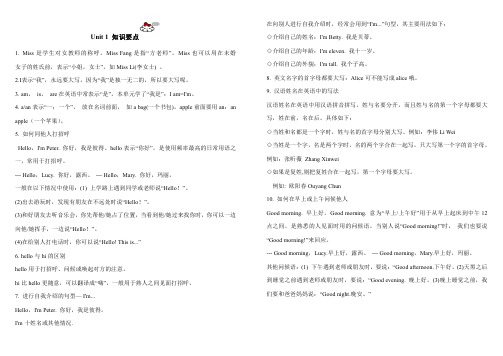
Unit1知识要点1.Miss是学生对女教师的称呼。
Miss Fang是指“方老师”。
Miss也可以用在未婚女子的姓氏前,表示“小姐,女士”,如Miss Li(李女士)。
2.Ⅰ表示“我”,永远要大写。
因为“我”是独一无二的,所以要大写呢。
3.am,is,are在英语中常表示“是”。
本单元学了“我是”:I am=I'm。
4.a/an表示“一;一个”,放在名词前面,如a bag(一个书包)。
apple前面要用an:an apple(一个苹果)。
5.如何同他人打招呼Hello,I'm Peter.你好,我是彼得。
hello表示“你好”,是使用频率最高的日常用语之一,常用于打招呼。
---Hello,Lucy.你好,露西。
---Hello,Mary.你好,玛丽。
一般在以下情况中使用:(1)上学路上遇到同学或老师说“Hello!”。
(2)出去游玩时,发现有朋友在不远处时说“Hello!”。
(3)和好朋友去听音乐会,你先帮他/她占了位置,当看到他/她过来找你时,你可以一边向他/她挥手,一边说“Hello!”。
(4)在给别人打电话时,你可以说“Hello!This is...”6.hello与hi的区别hello用于打招呼、问候或唤起对方的注意。
hi比hello更随意,可以翻译成“嗨”,一般用于熟人之间见面打招呼。
7.进行自我介绍的句型—I'm...Hello,I'm Peter.你好,我是彼得。
I'm十姓名或其他情况.在向别人进行自我介绍时,经常会用到“I'm...”句型,其主要用法如下:◇介绍自己的姓名:I'm Betty.我是贝蒂。
◇介绍自己的年龄:I'm eleven.我十一岁。
◇介绍自己的外貌:I'm tall.我个子高。
8.英文名字的首字母都要大写:Alice可不能写成alice哦。
9.汉语姓名在英语中的写法汉语姓名在英语中用汉语拼音拼写,姓与名要分开,而且姓与名的第一个字母都要大写,姓在前,名在后。
五年级第9课堂笔记
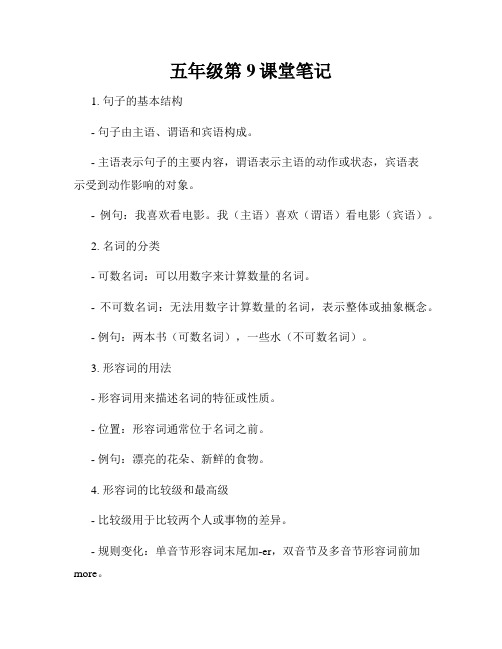
五年级第9课堂笔记1. 句子的基本结构- 句子由主语、谓语和宾语构成。
- 主语表示句子的主要内容,谓语表示主语的动作或状态,宾语表示受到动作影响的对象。
- 例句:我喜欢看电影。
我(主语)喜欢(谓语)看电影(宾语)。
2. 名词的分类- 可数名词:可以用数字来计算数量的名词。
- 不可数名词:无法用数字计算数量的名词,表示整体或抽象概念。
- 例句:两本书(可数名词),一些水(不可数名词)。
3. 形容词的用法- 形容词用来描述名词的特征或性质。
- 位置:形容词通常位于名词之前。
- 例句:漂亮的花朵、新鲜的食物。
4. 形容词的比较级和最高级- 比较级用于比较两个人或事物的差异。
- 规则变化:单音节形容词末尾加-er,双音节及多音节形容词前加more。
- 最高级用于比较三个或三个以上人或事物的差异。
- 规则变化:单音节形容词末尾加-est,双音节及多音节形容词前加most。
- 例句:这本书比那本书更有趣。
这是最好的电影。
5. 副词的用法- 副词用来修饰动词、形容词、副词和整个句子。
- 位置:副词通常位于动词、形容词或副词之前。
- 例句:他慢慢地走过来。
6. 动词时态- 动词的时态表示动作或状态发生的时间。
- 现在时态:表示现在正在进行的动作或经常性的动作。
- 过去时态:表示过去发生的动作或状态。
- 将来时态:表示将来要发生的动作或状态。
- 例句:我们每天都上学。
(现在时态)昨天我去了动物园。
(过去时态)明天我将去看电影。
(将来时态)7. 代词的用法- 代词用来代替名词。
- 人称代词:用来代替人或人物。
- 物主代词:用来表示所属关系。
- 例句:他喜欢读书,但是她不喜欢。
8. 阅读理解技巧- 阅读理解是在阅读过程中理解文章内容的能力。
- 技巧:仔细阅读问题和文章,寻找线索和关键词,理解文章中的主旨和细节。
- 例题:根据短文回答问题。
以上是五年级第9课堂的笔记,希望对同学们的学习有所帮助。
记住这些基础知识,能够帮助你们更好地理解和运用英语语法。
英语六年级课堂笔记
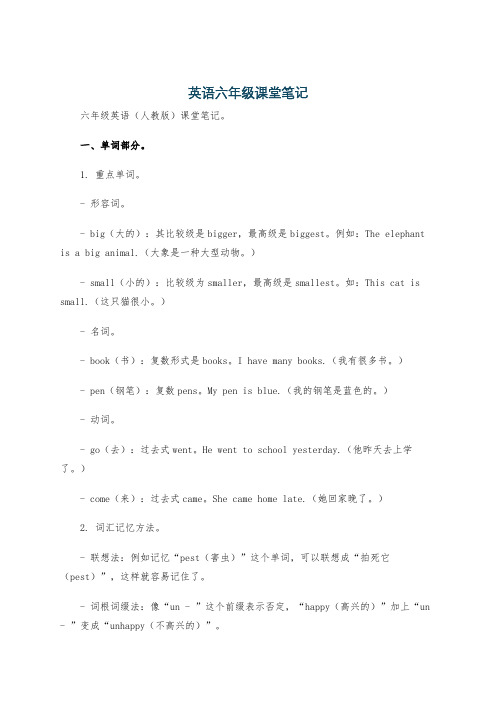
英语六年级课堂笔记六年级英语(人教版)课堂笔记。
一、单词部分。
1. 重点单词。
- 形容词。
- big(大的):其比较级是bigger,最高级是biggest。
例如:The elephant is a big animal.(大象是一种大型动物。
)- small(小的):比较级为smaller,最高级是smallest。
如:This cat is small.(这只猫很小。
)- 名词。
- book(书):复数形式是books。
I have many books.(我有很多书。
)- pen(钢笔):复数pens。
My pen is blue.(我的钢笔是蓝色的。
)- 动词。
- go(去):过去式went。
He went to school yesterday.(他昨天去上学了。
)- come(来):过去式came。
She came home late.(她回家晚了。
)2. 词汇记忆方法。
- 联想法:例如记忆“pest(害虫)”这个单词,可以联想成“拍死它(pest)”,这样就容易记住了。
- 词根词缀法:像“un - ”这个前缀表示否定,“happy(高兴的)”加上“un - ”变成“unhappy(不高兴的)”。
二、语法部分。
1. 一般现在时。
- 概念:表示经常或习惯性的动作或状态。
- 结构。
- 主语是第一、二人称单复数和第三人称复数时:动词用原形。
例如:I like apples.(我喜欢苹果。
)You play football every day.(你们每天踢足球。
)They go to school on foot.(他们步行去上学。
)- 主语是第三人称单数(he/she/it等)时:动词要加 - s或 - es。
如:He likes reading books.(他喜欢读书。
)She goes to work by bike.(她骑自行车去上班。
)- 时间标志词:often(经常),usually(通常),sometimes(有时),every day(每天)等。
英语课堂笔记
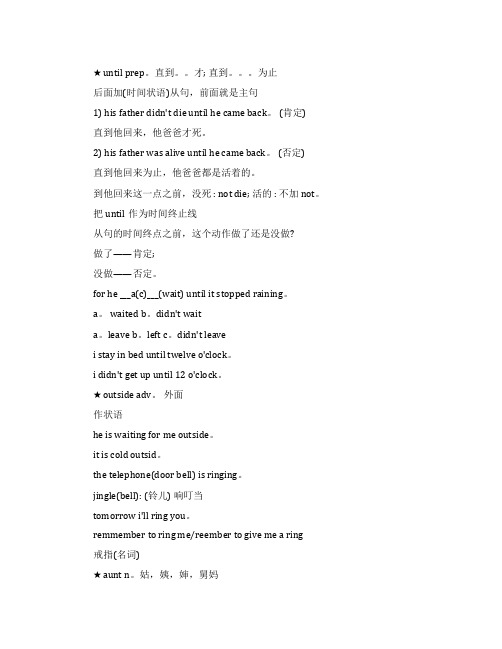
★until prep。
直到。
才; 直到。
为止后面加(时间状语)从句,前面就是主句1) his father didn't die until he came back。
(肯定)直到他回来,他爸爸才死。
2) his father was alive until he came back。
(否定)直到他回来为止,他爸爸都是活着的。
到他回来这一点之前,没死 : not die; 活的 : 不加not。
把until作为时间终止线从句的时间终点之前,这个动作做了还是没做?做了——肯定;没做——否定。
for he ___a(c)___(wait) until it stopped raining。
a。
waited b。
didn't waita。
leave b。
left c。
didn't leavei stay in bed until twelve o'clock。
i didn't get up until 12 o'clock。
★outside adv。
外面作状语he is waiting for me outside。
it is cold outsid。
the telephone(door bell) is ringing。
jingle(bell): (铃儿) 响叮当tomorrow i'll ring you。
remmember to ring me/reember to give me a ring戒指(名词)★aunt n。
姑,姨,婶,舅妈uncle: 叔叔cousin: 堂兄妹nephew: 外甥niece: 外甥女★repeat v。
重复'but i'm still having breakfast,' i said。
'what are you doing?' she asked。
'i'm having breakfast,' i repeated。
五年级上册英语课堂笔记(加注释)
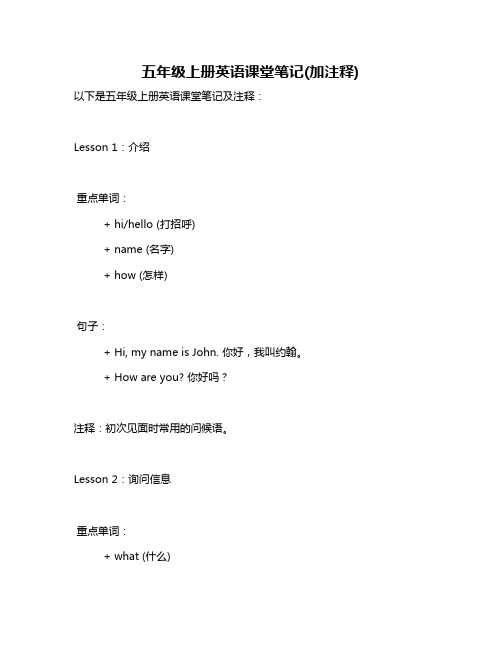
五年级上册英语课堂笔记(加注释)以下是五年级上册英语课堂笔记及注释:
Lesson 1:介绍
重点单词:
+ hi/hello (打招呼)
+ name (名字)
+ how (怎样)
句子:
+ Hi, my name is John. 你好,我叫约翰。
+ How are you? 你好吗?
注释:初次见面时常用的问候语。
Lesson 2:询问信息
重点单词:
+ what (什么)
+ is (是)
+ your (你的)
句子:
+ What is your name? 你叫什么名字?
+ Is your name Alice? 你的名字是爱丽丝吗?注释:询问别人姓名时的常用表达。
Lesson 3:介绍自己
重点单词:
+ I (我)
+ am (是)
+ ten (十)
句子:
+ I am ten years old. 我十岁了。
+ I like playing football. 我喜欢踢足球。
注释:自我介绍时常用的表达。
Lesson 4:询问年龄
重点单词:
+ how old (多大)
+ are (是)
+ you (你)
句子:
+ How old are you? 你多大了?
+ Are you eight years old? 你八岁了吗?注释:询问别人年龄时的常用表达。
五年级上册英语第九页课堂笔记
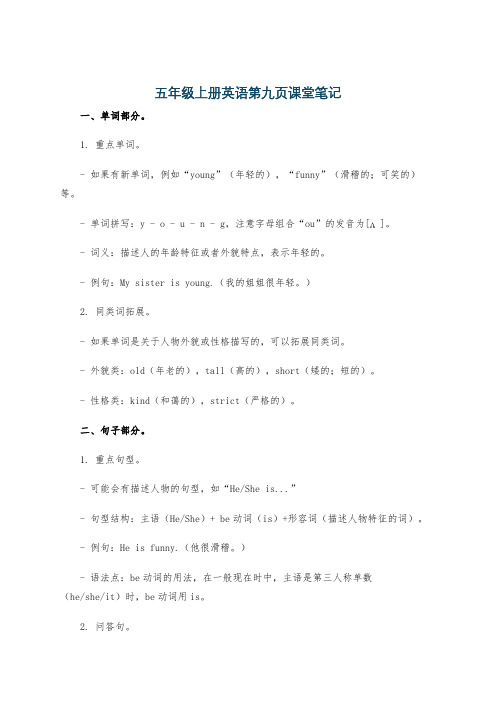
五年级上册英语第九页课堂笔记一、单词部分。
1. 重点单词。
- 如果有新单词,例如“young”(年轻的),“funny”(滑稽的;可笑的)等。
- 单词拼写:y - o - u - n - g,注意字母组合“ou”的发音为[ʌ]。
- 词义:描述人的年龄特征或者外貌特点,表示年轻的。
- 例句:My sister is young.(我的姐姐很年轻。
)2. 同类词拓展。
- 如果单词是关于人物外貌或性格描写的,可以拓展同类词。
- 外貌类:old(年老的),tall(高的),short(矮的;短的)。
- 性格类:kind(和蔼的),strict(严格的)。
二、句子部分。
1. 重点句型。
- 可能会有描述人物的句型,如“He/She is...”- 句型结构:主语(He/She)+ be动词(is)+形容词(描述人物特征的词)。
- 例句:He is funny.(他很滑稽。
)- 语法点:be动词的用法,在一般现在时中,主语是第三人称单数(he/she/it)时,be动词用is。
2. 问答句。
- 如果有问答形式的句子,例如:- 问:What's he like?(他是什么样的人?)- 答:He is young and kind.(他年轻又和蔼。
)- 问答句的注意事项:特殊疑问句中,疑问词what询问的是人物的特征;回答时要根据实际情况使用正确的形容词。
三、课文理解部分。
1. 课文主旨。
- 如果第九页是一篇小短文,概括短文主要是在描述人物,可能是介绍新的老师或者朋友等。
2. 细节理解。
- 文中人物的具体特征,如年龄、外貌、性格等。
可以通过划出文中关键句子来加深理解。
例如:“Our new teacher is very young and she has long hair.”(我们的新老师很年轻,她有长头发。
)这里就包含了年龄(young)和外貌(long hair)两个细节。
- 1、下载文档前请自行甄别文档内容的完整性,平台不提供额外的编辑、内容补充、找答案等附加服务。
- 2、"仅部分预览"的文档,不可在线预览部分如存在完整性等问题,可反馈申请退款(可完整预览的文档不适用该条件!)。
- 3、如文档侵犯您的权益,请联系客服反馈,我们会尽快为您处理(人工客服工作时间:9:00-18:30)。
英语课堂笔记(句子结构)【重点】一、词性的概念:英语中的单词根据词义、句法作用和形式特征所作的分类。
共有十类:名词、动词、形容词、代词、数词、冠词、副词、介词、连词、感叹词。
1、名词,"名"就是名称---人或事物的名称.具体的人或物体的名称:人名---Mike, Li Ming;地名—America, China动物名---pig, dog;植物名---tree, wheat。
抽象的事物的名称:idea(主意), victory(胜利), knowledge(知识).2、代词,何谓―代‖?即是替代的意思,主要是来替代名词,所以说名词和代词关系是很近的,或者说代词的实质就是名词,正是这种血液关系,绝大多数时候代词跟名词在句中起的作用是一样的。
代词,从英语词汇的整体来看数量并不多。
3、动词,"动"就是动作--人的五官动作: walk, jump, swim;人的大脑动作(心理活动): think, imagine。
也有些动词是表示静止的,如:am,is,are。
4、形容词,我们在谈论人或物时,常说:―你描述一下是什么样子。
‖你就要用上:tall(高的),short矮的),black(黑的),white(白的)这些词往往是修饰名词,它们就是形容词。
5、副词,说人行走得快慢,讲话清楚,在英语里就要用quickly(快地),slowly(慢地),clearly(清楚地)这些词往往来修饰动词。
它们就是副词。
副词很多是从形容词加ly构成的,所以看单词词尾是否有ly是判断是否是副词的一种方法,但是词尾是ly的也不一定都是副词,可能是形容词,不过只有少量的单词(常见的有likely,friendly lovely,lonely,weekly,monthly,yearly),这几个单词需要加强记忆,也不就是几个单词特殊嘛,不过考试往往就考特殊的,你要小心才是呀!沪版英语微测试(10分钟)Choose the best answer:The tradition of birthday parties started a long time ago. There are some traditions that you can find almost anywhere, anytime, such as sending birthday cards, blowing out the candles on a birthday cake and singing the ‗Happy Birthday‘ song. Others are only found for certain ages and in certain countries.In China, on a child‘s second birthday, family members put many things on the floor around the child. According to Chinese tradition, the first thing that the child picks up tells you what profession the child will choose later in life.For Japanese children, the third, fifth and seventh birthdays are especially important. At this age, there is a special celebration Shichi-Go-San (seven, five, three in Japanese) when children go to the temple wearing a new kimono (和服). The priest (僧侣) gives them special sweets, and the parents usually organize a party for their friends in their home.In Argentina, Mexico and several other Latin American countries, girls have a special birthday celebration when they reach the age of fifteen. After a special ceremony (仪式), the girls dance a waltz with their father and other boys.Eighteen is the traditional ‘coming of age’—the age when (in many countries) you have the right to vote (选举), join the army and (in Britain) drink alcohol or buy a house.In many English-speaking countries, a twenty-first birthday cake often has a key on top, or the cake itself is sometimes in the shape of a key. The key means that the young person is now old enough to leave and enter the family home at any time they want to!84. Which of the following birthday traditions can be found almost anywhere, anytime?A) Putting many things on the floor. B) Wearing a new kimono.C) Dancing a waltz. D) Sending birthday cards.85. The usually organize a party at children‘s special birthday celebration in Japan.A) priests B) parents C) friends D) relatives86. Mexican girls have a special birthday celebration at the age of .A) five B) seven C) fifteen D) twenty-one87. In many countries you can ________ when you reach the age of eighteen.A) join the army B) have a keyC) have a special ceremony D) have special sweets88. Which of the following sentences is NOT true?A) The tradition of birthday parties started a long time ago.B) Some birthday traditions are only found in certain countries.C) You become the owner of your house at the age of fifteen.D) In many countries you have the right to vote at the age of eighteen.89. Which is the best title of this passage?A) Birthday Traditions around the WorldB) Chinese Birthday CelebrationsC) Japanese Special CelebrationD) The Drinking Age in Many CountriesChoose the words or expressions and complete the passage:All about Britain‘s TeenagersSchoolBritish teenagers can leave school at sixteen after taking their GCSE exams. They study for exams in as many as ten subjects, 90 they have to work pretty hard! Today‘s teens spend more time doing their homework than any teenagers in the past, studying for 2.5 –3 hours every evening.Free TimeIt‘s not all work, of course. What do British teenagers do to have 91 ? They love watching TV, going out, meeting friends in Internet cafés and listening to music.CommunicationsIn addition to the Internet, teenagers in Britain use their computers to play games and do their homework. They 92 love their mobile phones, and spend hours texting (发短信) their friends and chatting. Today, phones are getting smaller and lighter and you can do a lot more93 them than just talk. Text messaging has become the coolest and most popular way to communicate. More than 90% of 12- to 16-year-olds have a mobile, and experts say that this stops 94 from spending their money on sweets and cigarettes.Fashion (服饰)At school, almost all British teenagers have to wear a school uniform. However, in their free95 they can wear whatever they like, and what they like is designer names such as Nike, Diesel and Paul Smith. In fact, 40% of British teens say that they think it is important to have the latest fashion. Looking good doesn‘t come 96 , but many tee nagers think it usual or easy to spend more than £100 on one item of clothing.90. A) but B) or C) so D) because91. A) lessons B) sports C) advice D) fun92. A) never B) already C) also D) no longer93. A) with B) for C) at D) in94. A) teachers B) relatives C) friends D) teenagers95. A) day B) time C) week D) month96. A) cheap B) expensive C) special D) ordinary通常,我们可以从两个不同的角度对句子进行分类:一是按句子的用途;二是按句子的结构。
